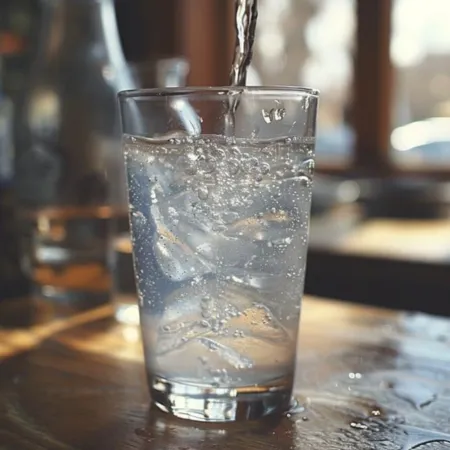Ever notice your voice changing suddenly and getting rough after forgetting to drink water all day? You’re not alone!
Staying hydrated is super important for healthy vocal cords.
This blog examines how lack of water hurts your voice and how to recover it and keep sounding great.
Key Takeaways
– Imagine singing with rusty guitar strings – that’s what dry vocal cords feel like. Water makes your voice smooth.
– When you don’t drink enough, your vocal cords get dry and scratchy. Talking or singing feels awful, like sandpaper on your throat.
– Is your voice feeling raspy, you having trouble with high notes, or you have a scratchy throat? You need water.
– Sip water all day and avoid coffee and soda. Use a humidifier in dry air, and eat juicy fruits and veggies like watermelon and cucumber.
– Just like stretching before exercise, do vocal warm-ups before singing or talking. Don’t forget to cool down afterward.
Can Dehydration Affect Your Voice?
Yes, dehydration affects your voice in more than one way.

Being dehydrated isn’t just about feeling thirsty. It can affect our bodies and damage vocal cords.
A study on the role of hydration in vocal fold physiology shows that being dehydrated hurts your vocal cords.
When you’re dehydrated, your vocal cords get thicker and stickier, making it harder for them to vibrate properly.
This can make your voice sound different, like breathy or hoarse.
How Dehydration Affects The Voice
Your voice is important whether you sing, give speeches, or like to chat. Drinking enough water helps keep it healthy.
Not drinking enough water can mess up your vocal cords.
1. Downside Of Dehydration
Imagine your vocal cords as two tiny, delicate strings inside your throat.
Drink enough water, and your vocal cords will be loose and flexible. This makes it easy to sing high notes and speak clearly.
If you don’t drink enough water, your vocal cords dry out, like guitar strings left in the sun. This can make them hurt.
2. Dryness, Irritation, And Inflammation
Not drinking enough water dries vocal cords. This makes your throat feel scratchy and ticklish, like rough paper.
Dryness also bothers your vocal cords, making it uncomfortable and hard to talk without hurting your voice.
On top of that, without moisture, your vocal cords can get inflamed, like puffing up a balloon. This makes speaking even harder.
3. Impaired Vocal Function And Performance
When you don’t drink enough water (dehydration), your vocal cords dry out. This makes them stiff and harder to move.
Because of this:
– Singing high notes becomes difficult.
– Your voice might sound raspy or tired.
– It may also sound weak and not as full as usual.
Using your voice a lot without drinking enough fluids could damage vocal cords.
Signs And Symptoms Of Dehydration
Do you ever feel a little off but can’t figure out why? Your body has ways of telling you it needs water.
Let’s look at some signs you are dehydrated.
1. Hoarseness And Roughness
Does your voice feel scratchy? You might be thirsty!
Screaming can make you hoarse, but not drinking enough can too.

Like the rest, your vocal cords need water to work well.
If they get dry, your voice will become scratchy, like a frog’s! The good news is that drinking water will make your voice happy again.
2. Difficulty Hitting High Or Low Notes
Drinking enough water helps your voice work better, just like it helps the rest of your body.
Dry vocal cords become stiff and can’t move easily, making it hard to sing high or low notes.
Think of your vocal cords like guitar strings – they need moisture to vibrate smoothly.
So, drink some water if you want to hit those high notes or deep sounds.
3. Dry Or Scratchy Sensation In The Throat
A rough and irritated throat is your body’s way of saying it’s thirsty! Forget yelling at the TV, that scratch might just mean you need a drink.
When your body doesn’t get enough fluids, it can’t keep your throat nice and smooth.
That’s why it feels scratchy, like you swallowed sandpaper!
4. Persistent Coughing Or Throat-Clearing
Have a cough that won’t quit? It could be allergies or a cold, but don’t forget you might just be thirsty!
When your throat feels dry and irritated, your body tries eliminating that feeling.
So, if you’re coughing a lot, drink water first.
5. Fatigue Or Discomfort
If you don’t drink enough water, your voice can get hoarse. Your vocal cords need water to work well.
If they’re dry, they have to work harder, which can make your voice tired.
Hydrate Your Voice: The Key To Vocal Health
Stay hydrated to keep your voice working its best. Singers, speakers, even chatty folks – water is key for a healthy, happy voice.
1. Benefits Of Proper Hydration
Picture this: you’re about to step on stage to deliver a speech or sing your heart out at a concert.
Your voice feels clear, strong, and ready to conquer the world.
What’s the secret behind this vocal prowess? Hydration.

Water keeps your vocal cords nice and moist, like soft sponges. This lets them move freely and makes your voice sound clear and powerful.
2. Ways Of Maintaining Vocal Hydration
Here are some easy tips to keep those vocal cords happy and healthy.
– Sip water often all day. Don’t wait to chug a lot at once. Carry a water bottle to stay hydrated and keep your voice happy.
– Coffee and wine are great, but they dry you out, which hurts your vocal cords. Limit them and drink lots of water instead.
– Dry air makes your voice grumpy! A humidifier adds moisture to the air, which makes your vocal cords happy and your voice healthy.
– Eat watery fruits and veggies like cucumber, watermelon, and orange to give your vocal cords an extra hydration boost.
Practical Tips For Vocal Hydration
Your voice needs water to sound great, just like the rest of you. These are easy tips to keep your vocal cords healthy.
1. Establishing A Hydration Routine
Drink plenty of water throughout the day to keep your voice healthy. Think of it like a workout for your singing (or talking).
Having a drink schedule can help.

Here’s how to do it:
– Sip by sip all day: Don’t chug a lot of water at once. Carry a water bottle and take small drinks throughout the day.
– Phone reminders for water breaks: Set phone alarms to remind yourself to drink water every hour in case you forget.
– Pee color check: The color of your pee shows if you need more water. Aim for light yellow, not dark.
2. Importance Of Pre-Performance Hydration
Drink plenty of water before you give a speech or presentation. This keeps your vocal cords happy and helps you sound your best.
Here’s why pre-performance hydration matters:
– Beat dry mouth: Sip water before you sing or talk a lot. It keeps your mouth comfy and makes your voice sound better.
– Sing or talk longer: Water helps your vocal cords work harder without getting tired. You can belt out those tunes or chat for ages.
3. Hydration For Specific Situations
Taking flights and singing outdoors can dry out your voice. Here’s how to stay hydrated in those situations:
– Planes: The air on planes is dry, so drink lots of water before, during, and after your flight to keep your voice happy!
– Singing outside: Drink even more water than usual. Carry a water bottle and take frequent sips.
4. Incorporating Vocal Warm-Ups And Cool-Downs
Drinking enough water and warming up your voice before using it can help keep your voice healthy.
You should also cool down your voice after using it a lot. Here’s how to do it:
Before you get going:
– Spend a few minutes warming up your voice. This is like limbering up before exercise!
– Hum, trill your lips, or do “sirens” (sliding up and down in pitch with your voice).
– This helps your vocal cords get ready to work by increasing blood flow and lubricating them.
After you’re done:
– Take a few minutes to cool down your voice.
– Do some gentle stretches and relaxation exercises.
– This helps your vocal cords relax and prevents them from getting sore.
Conclusion
Your vocal cords need water to work well, just like a plant. If they dry out, your voice gets scratchy, and talking or singing becomes harder.
Drinking water all day helps, as does eating watery fruits and veggies and avoiding too much coffee and alcohol.
Water keeps your voice sounding good, so you can talk easily, give presentations, or sing your heart out! Drink plenty of water, and your voice will be happy!
Resources For Further Study
– “Impact of Vocal Fold Dehydration on Vocal Function and Its Treatment” Zhe-fei Zou, Wei Chen, Wei Li & Kun Yuan University of Science and Technology, Wuhan.
– “The Effect of Hydration on Voice Quality in Adults: A Systematic Review” Esedra Krüger, Bhavani Pillay University of Pretoria.
- How To Keep The Conversation Going: 12 Expert Tips That Work - December 26, 2024
- Master Speech And Debate: 5 Essential Tips For Success - December 16, 2024
- 11 Communication Quotes To Inspire & Improve Conversations - November 20, 2024

Leave a Reply